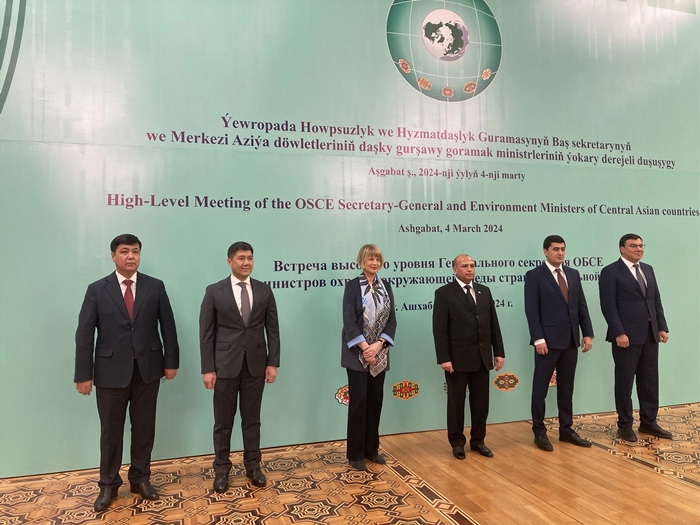On 4 March 2024, the Organization for Security and Co-operation in Europe (OSCE) and Central Asian environment ministers convened in Ashgabat to discuss regional ecological cooperation, according to TDH.
OSCE Secretary General Helga Schmid emphasized the meeting’s significance, highlighting its role in refocusing attention on contemporary environmental challenges.
Schmid stressed that primary aspects of climate issues directly related to the promotion of sustainable development, ensuring energy and food security and, in general, well-being and stability in the region.
Sustainable water management, the development of water diplomacy, and specifically, women’s involvement were identified as key issues. The OSCE has established close partnership with Central Asian states in these areas.
During the meeting, Turkmenistan outlined its priorities for regional ecological cooperation.
Having joined all major environmental conventions and agreements, Turkmenistan demonstrates a strong commitment to their implementation. It regularly proposes key initiatives that receive international support, such as those related to environmental safety, resource management, and combating climate change and desertification.
Turkmenistan actively collaborates with international organizations, including the OSCE Center in Ashgabat, fostering a high level of cooperation in environmental protection.
Building on its initiative to establish the Regional Center for Climate Technologies in Ashgabat, Turkmenistan proposed hosting an OSCE forum on climate change technologies.
Turkmenistan is currently implementing an updated National Climate Change Strategy.
The strategy focuses on large-scale programs to reduce greenhouse gas emissions through economic modernization and widespread adoption of innovative green technologies. Additionally, millions of trees are planted annually as part of the National Forest Program.
In 2022, Turkmenistan’s nationally determined contribution to the Paris Climate Agreement was approved. Currently, the country is implementing measures arising from this document, and in 2025 work will be carried out to update NDC.
Furthermore, Turkmenistan joined the Global Methane Pledge at the 28th Conference of the Parties to the UN Framework Convention on Climate Change.
Delegates from Kazakhstan, Kyrgyzstan, Tajikistan, and Uzbekistan emphasized climate change adaptation, coordinated disaster risk reduction, and public awareness campaigns as key priorities.
The meeting also addressed water and agricultural issues, the transition to a “green” economy, waste management, emissions reduction, and fostering an ecological culture, particularly among youth.
Participants expressed confidence that ongoing dialogue between Central Asian states and the OSCE will strengthen international attention to environmental issues and safeguard the region’s shared natural heritage for future generations.///nCa, March 5, 2024
TASS: The OSCE is developing a strategy to eliminate climate risks in the highlands of Central Asia
At a meeting with Central Asian environment ministers, OSCE Secretary General Helga Schmid announced the development of a strategy to address climate risks in the region’s high-altitude areas, TASS reports.
The strategy, based on regional consultations, will encompass four key areas: life support systems, security, agricultural and grazing lands, and sustainable water management.
According to Schmid, the strategy will also address glacier melt’s impact on resource management, emergency response, and related risks. Additionally, a concrete implementation plan with cross-border initiatives is being formulated.
Schmid further highlighted a recently launched OSCE project focusing on protecting energy infrastructure from extreme weather events. This project involves three aspects: risk assessment for energy systems, regional climate modeling, and collaboration with local experts on data interpretation and integration.
The project’s recommendations, she noted, will be presented at a regional seminar in Vienna later this year, gathering decision-makers and experts from 15 beneficiary countries across Central Asia, Eastern and Southeastern Europe, and the Mediterranean region. ///TASS, 4 March 2024
